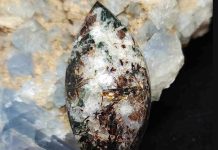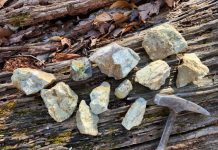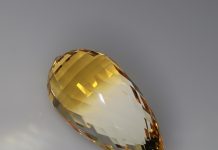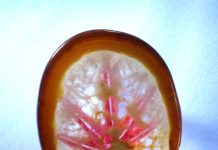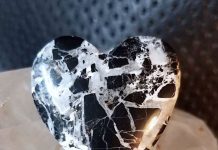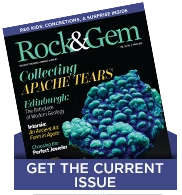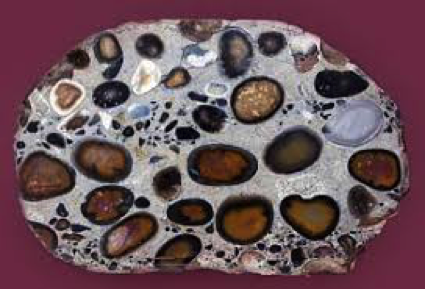
Editor’s Note: The Rockhound Review is a space where guest contributors can weigh in on topics stirring within the rock, gem and mineral community or share their insights (serious and lighthearted) about a specific topic. The views shared here are those of the guest contributors.
By Mark Maller
Illinois
Over 5,000 mineral species are on earth (Brittanica) and the total is lower or higher, depending on the authoritative source. Many new ones are discovered every year, so it is impossible to keep up to date or know about most of them. That does not include mineral names that are not a species, such as ruby (corundum), aquamarine (beryl), carnelian, agate, (quartz), peridot (olivine), amazonite .
Minerals are typically named after the person who discovered it or its location, but some names have more interesting origins, and some are misleading and do not sound like minerals at all. It’s fun to recognize them here and imagine other minerals combined together.
Examining Names
Amazonite is named after the Amazon River, allegedly has healing properties. It might be found with salesite, a bluish vitreous stone from Chile. No, there is not onlineite or freeshippingite.
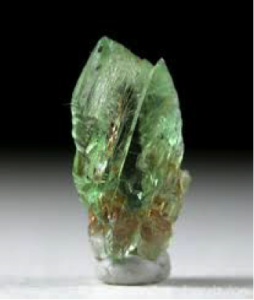
Microcline is a feldspar, that in fact, is often associated with amazonite, also called amazon stone, that are bluish gems made into cabochons. It would appear as if Microsoft and Amazon merged and became Microamazon! (Microcline means small slope.)
Childrenite is not for kids. It’s a brownish phosphate, named after John G. Children (1777-1852) but sounds like a pretend mineral species.
Sprudelstein is a synonym for aragonite of German origin ( CaCO3.) I like the name because it reminds me of strudel with a stein. Aragonite is one of my favorite minerals.
Exploration of the
Fukalite is not pronounced phonetically as you think. It is calcium and silica crystals, named for its locality in Japan.
Valentinite (Sb2O3) would be a good gift to your beloved on February 14, Valentine’s Day. It’s antimony with orthorhombic crystals.
Puddingstone (or plum-pudding) is a clever popular name for pebbly conglomerates.
Genesis Rock is the name of moon rock, given by the Apollo 15 astronauts. Imagine if it is found with serpentine, adamite, aplite in a garden of edenite!
That might make a nice display.
More Fascinating Names
Adamite is a vitreous zinc arsenate hydroxide with crystals, aplites are igneous rocks, and edenite is a silicate in the hornblende group.
Hiddenite is a gemmy green variety of spodumene , discovered by William Hidden (1853-1919), a mineralogist, but he did not identify it as such. Suppose he was introducing himself. “Hello, my name is Hidden.”
“Why so? What is your name?”
“Hidden, I said. I’m Hidden”. “Well, I see you easily. You are not hidden.”
“Yes I am! That’s my real name”. Would you believe him?
Bowel Stone is a synonym of tripestone and is named for its appearance. As a variety of anhydrite, it is composed of calcium and sulfate and found with orthorhombic crystals. Would you show off your bowel stone?
Everyone has heard of Leaverite, short for “leave it right there!” Good name for unwanted rocks, and how about others you shouldn’t take home?
Rubblite. Ignorite. Wastotimeite. Nothing Stone.
Rock Options for a Collection
These rocks might make excellent additions to your collection—
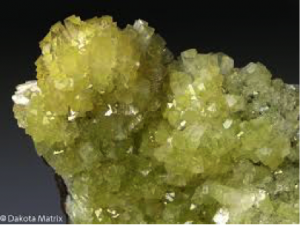
Grabitite. Cuthisite for lapidarists. Takerite. Dazzline.
And rocks you cannot identify: I have found many metamorphic unrecognizable stones, very beaten by the weather I call Obscurite. Consider also: Foolerite, Deceptomene, Confuserite, Wonderstone.
Interestingly, it is well known that many English words have Greek and Latin origins, such as petrology, study of rocks from the Greek petra or Latin petram, meaning rock. With this in mind, we might consider new names for the knowledge of minerals and their lore.
Epistemine. (Episteme is knowledge in Greek. Mineral is from Latin.)
Philopetras. (Philo is love in Greek.) Love of rocks.
Do you philopetras? Have much epistemine?



